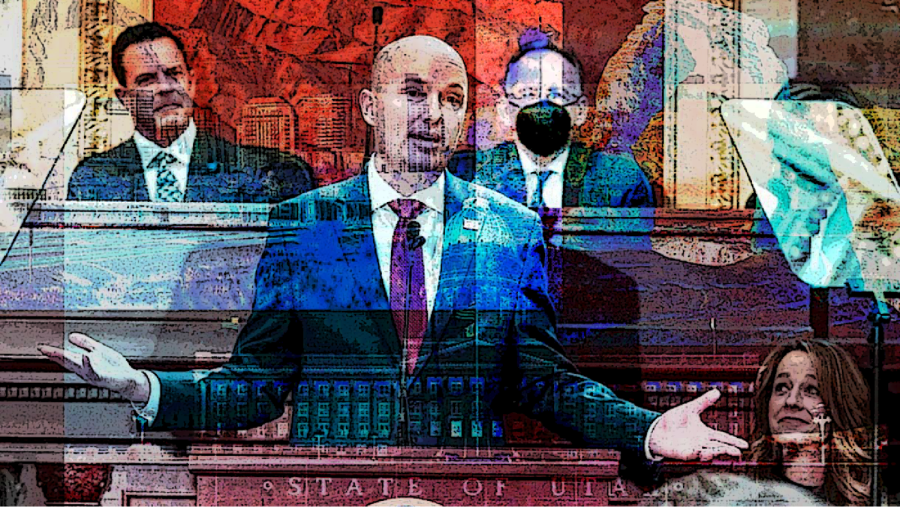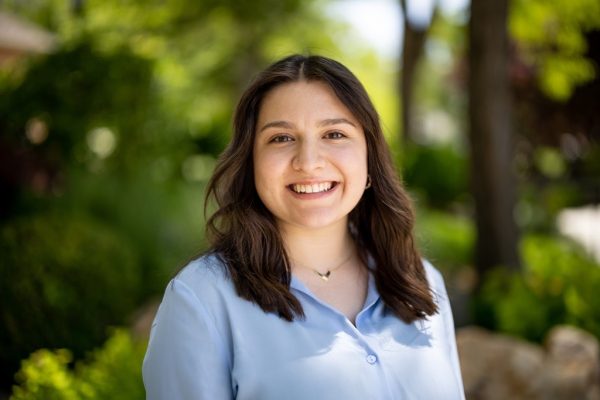Gov. Cox Tells Utahns To Prepare for Flooding With Above Normal Snowfall to Melt
(Graphic by Claire Peterson | The Daily Utah Chronicle)
March 19, 2023
Gov. Spencer Cox held his monthly press conference on March 16, discussing social media regulations, water rights, abortion restrictions, and equity, diversion and inclusion. As the March 23 deadline to sign bills draws near, Cox said he has no plans to veto any bills.
Water
On March 15, the Church of Jesus Christ of Latter-day Saints announced they would permanently donate 5,700 of their water shares to the Great Salt Lake. That is equivalent to 20,000 acre-feet of water annually.
“We’re incredibly grateful for the church, for their generosity and their commitment to preserving this critical ecosystem,” Cox said.
Cox said while Utah is having a great water year, flooding is a major risk to Utah. On Wednesday, a family of five, including three young children, was rescued from flash flooding in Snow Canyon State Park. Additionally, two men were found dead after floodwaters poured into a slot canyon near the Utah-Arizona border, another man being taken to the hospital to be treated for hypothermia and bodily injury.
Cox said Utah needs to be prepared for the number-one disaster risk to Utah. He issued an executive order allowing eight hours of paid leave for state employees to volunteer and help when flooding occurs. Cox also asked Utahns to use common sense.
“Please do not drive in flooded streets,” he said. “The potential for drowning is real. Stay alert, listen to the news and weather alerts when storms are headed your way, especially if you are in the outdoors.”
Age Verification for Social Media Apps
Cox said he plans to sign S.B. 152, which would require Utahns to upload age-verifying information to social media apps in order to use them.
Free-speech advocates have criticized the bill but Cox said the government needs to protect kids from the dangers of social media. He compared kids’ use of social media to 12-year-olds owning guns.
“Even the most pro-gun lobby doesn’t believe that we have to let 12-year-olds buy AR-15s, and yet the Constitution guarantees a second amendment right to Americans,” he said.
As far as court cases and challenges go, Cox said he is confident they have the evidence to win. He believes several cases were wrongly decided when it comes to the internet being classified under free speech protections.
“There’s no doubt there’s going to be legal challenges, the same type of legal challenges that we saw with big tobacco, the same type of legal challenges that we saw with Big Pharma and opioids and so I’m not going to back down from a potential legal challenge when these companies are killing our kids,” he said.
Abortion Restrictions
Cox signed H.B. 467, a bill that will outlaw abortion clinics, on Wednesday. He said the new law will not put a de facto ban on abortion because it remains legal up to 18 weeks in the state.
“The trigger law that was passed several years ago would have enacted a de facto complete abortion ban, because there wasn’t clarity around rape, incest and the health and safety of the mother,” Cox said. “This bill clarifies that so that those abortions can continue.”
The new bill builds upon Utah’s abortion trigger law, which has been blocked since a few days after it went into effect last summer.
Changes from the new bill include clarifying the definition of abortion and that a doctor can provide one under the trigger ban’s exceptions which include for rape, incest, when the life of the mother is at risk and for a fatal fetal abnormality.
Access to abortion medications through pharmacies could be restricted more, as a federal court is considering whether to stop providing mifepristone, one of the two pills taken for an abortion. Walgreens has already decided not to sell the pill in Utah after a letter from Attorney General Sean Reyes.
Equity, Diversity and Inclusion
Late in the legislative session, Sen. John Johnson introduced S.B. 283, which was introduced to prohibit diversity, equity and inclusion programs in higher education, but was pulled by the bill sponsor after he recognized his proposal was “way too harsh.”
“There’s good diversity and inclusion, and there’s not good diversity and inclusion,” Cox said.
Cox said it is important everyone is included, but some programs need to be looked at to make sure they’re doing what they’re supposed to do.
“I think it is important that we work to make sure that everyone feels included. But we don’t have to exclude people to make that happen,” he said.
Cox said he feels good about where the session ended up and those bills targeting DEI programs either didn’t pass or were changed drastically.
“I always tell people, you can judge the legislature, by what gets passed, not by what gets introduced,” he said.








